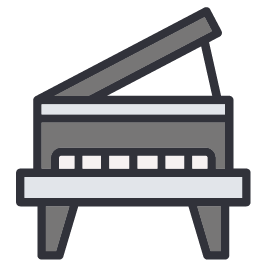Learning to play the piano as an adult can feel intimidating. Many adults hesitate to begin because they believe it’s too late, or they fear they won’t have the time or ability to succeed. But the truth is that adult learners often bring a level of focus, motivation, and emotional connection to music that children can’t yet access. The key is learning how to start smart, stay motivated, and build confidence from the very beginning.
Challenging the Myth of “Too Late”
One of the most common barriers adults face when considering piano lessons is the belief that they are simply too old to learn. This myth is rooted in the idea that children absorb skills faster and are more adaptable. While it’s true that young minds can pick up new information quickly, adults bring many advantages to the learning process.
Adults tend to have greater discipline, clearer goals, and a deeper appreciation for the music they choose to study. They’re often more self-aware and more capable of reflecting on their own progress. With a good teacher and the right mindset, adults can make remarkable progress and find genuine joy in the process.
Building a Strong and Simple Foundation
For adult beginners, the early focus should be on building a strong and simple foundation. There’s no need to rush into complex pieces or advanced theory. Instead, start with the basics of finger positioning, rhythm, and reading simple sheet music. Small wins at this stage can build confidence quickly.
Choosing beginner-friendly songs that are familiar and emotionally meaningful can make early practice more enjoyable. Whether it’s a pop song from your youth, a classical favorite, or a piece from a favorite film, starting with music you care about helps build motivation and emotional engagement.
Making Time Work for You
Another concern adults often raise is time. With jobs, families, and other responsibilities, it can be difficult to imagine where piano fits into a busy week. The good news is that effective practice doesn’t require hours each day. Just 15–30 focused minutes a few times a week can lead to steady improvement.
The key is consistency and intention. Instead of passively playing random pieces, set small goals for each session. For example: “Today I’ll work on playing this line hands together,” or “I want to practice keeping steady rhythm for one full piece.” Over time, short, goal-oriented practice builds real momentum.
Choosing the Right Learning Environment
Confidence grows when you feel supported. Whether you’re learning with a private teacher, in a group class, or through online lessons, it’s important to find a method and atmosphere that matches your learning style. A good teacher will encourage progress, correct gently, and celebrate small victories along the way.
If you’re learning online, choose structured programs that offer both video guidance and written material. Look for communities or forums where adult learners can share experiences and questions. Knowing that others are going through the same challenges can help you stay motivated and engaged.
Embracing Mistakes as Part of the Process
One of the most powerful mindsets for adult learners is understanding that mistakes are part of learning, not a sign of failure. You will hit wrong notes. You will forget fingerings. You may get frustrated with your pace. But none of this means you’re not capable — it means you’re growing.
Children often learn without fear of judgment because they’re expected to be beginners. Adults, on the other hand, can carry expectations of perfection into their learning, which only leads to unnecessary pressure. Reframing mistakes as moments of discovery helps reduce anxiety and builds long-term confidence.
Celebrating Progress — Big and Small
Learning piano as an adult isn’t a race. It’s a personal journey of growth, expression, and enjoyment. Make time to recognize your progress. Record a piece you’ve learned. Play for a friend or loved one. Revisit your first exercises and notice how far you’ve come.
Even being able to read a few lines of sheet music, play a scale smoothly, or recognize a chord shape is something to celebrate. These milestones are signs that your effort is paying off and that you’re building real skill.




